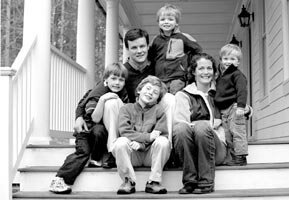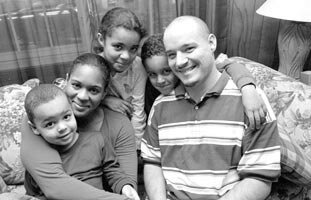Different strokes: How do they do it?

PHOTOS BY JEN FARIELLO

The Reicherts
Parents: Beth and Hunter
Kids: Harry, 8; Ben, 7; Charlie, 4; Jack, 2
It's controlled mayhem at the Reichert's stately Free Union home on a recent rainy afternoon. Eight-year-old Harry and 7-year-old Ben tear across the wraparound porch on scooters, while four year-old Charlie and two-year-old Jack scamper after their brothers. Inside, however, the house is neat, and Beth and Hunter Reichert seem utterly unfazed by the general commotion.
They're used to the question, "How do you do it?" and admit that having four boys means that every day is a juggling act– one that led Beth to give up her teaching job and devote herself fulltime to motherhood.
"I just couldn't promise I'd be able to be at work," she says, citing the likelihood that with four kids, the chances of one being home sick would exceed any job's sick day offerings.
Fortunately for Beth, Hunter's job as a financial advisor allows him to shoulder half the work in the morning and evenings. He gets Harry and Ben ready for school and on the bus by 8am, while Beth feeds and dresses Charlie and Jack before delivering them to morning preschool programs. Afternoons and weekends are consumed with homework and sporting events including baseball (which Hunter coaches), football, swimming, soccer.
Some days, says Beth, "it's crazy," with as many as three practices or games to attend– and each on a different side of town.
Bedtime comes early– a parental sanity preserver, no doubt– with all four reading in bed at 7:30pm, and lights out at 8pm.
Beth and Hunter say they do find time to get away. "We go out at least one night a week," says Beth. "We need it."

The Hales
Parent: Grace
Kids: Emma and Sarah, 5
Having twins is a challenge for any family, but for a single parent? Yikes! Grace Hale, professor of history and American studies at UVA, is mom to five-year-old twins Sarah and Emma, and while she says it can be twice the fun, getting through the day can also be a "grind."
A typical weekday starts at 7am, with Hale making breakfast, getting herself dressed for work, then "frantically trying to get them dressed." She says getting the girls to school on time– 9am at University Montessori– is her "biggest accomplishment of the day."
In addition to an overnight each week, their dad, also a UVA professor, picks them up in the early afternoon and delivers them home to Hale by 5pm, and the grind begins again.
"We talk about their day, we eat around 6, play a game or do an art project, start bath at 7, go to bed at 7:45," she says.
The hard thing, Hale says, is "always having to push them on this schedule."
But while it's tough now, she says, it's nothing compared to the first three and a half years, which were "insanely difficult." During those early years, she remembers, "There were never moments of calm, because when one was calm, the other one was bouncing off the walls."
Now, however, having twins may be easier than having an only child or siblings of different ages. "They're on the same schedule," she says, "and they play together all the time."

The Tupelo/Freemans
Parents: Thea Tupelo, Tom Freeman
Kids: Jonah, 4; Gwen, 2
There are few places where the old adage "It takes a village to raise a child" is more evidently true than at Twin Oaks in Louisa County, where "co-parents" Thea Tupelo and Tom Freeman are raising four-year-old Jonah and two-year-old Gwen, though they are no longer together as a couple.
Slightly more than 100 people–12 of them children– live in the 600-acre "intentional community" perhaps best known for its production of hammocks, tofu, and, of course, Charlottesville's best known girl-with-a-guitar, Devon.
Raising children in this bucolic "camplike" setting is vastly different from parenting in the outside world, says Tupelo, 36, who came to Twin Oaks six years ago after grad school but had lived in similar communities since her early 20s.
With no television and virtually no-prepackaged food, it may be hard for parents in the outside world– used to flicking on Sesame Street and bartering Oreos for a few minutes of peace– to imagine how Tupelo and Freeman manage. But they say they wouldn't have it any other way.
"If someone looked at us, they could say we are the poorest people in the world," says Tupelo, "or they could say we are the richest."
Part of the richness of living at Twin Oaks, she says, is the support parents get from the community. Every member is expected to contribute 38 hours of work each week to the various tasks required to keep the farm functioning. People vie to cook the community meals, while others prefer weaving hammocks, herding cows, or washing clothes– many of which are shared by everyone in the community. Still others handle all aspects of the tofu business, from manufacture to sales.
But Tupelo gets her work credit by spending much of her day with her kids.
"They are supporting the effort of childrearing," she explains of the Twin Oaks philosophy. "Children are intrinsic to our health and our future."
In addition to receiving work credit for child rearing, Tupelo says, she receives extensive support from members of the community who are her children's "primaries," people who have known them since birth and who spend hours of scheduled time with the kids every week.
That time allows Tupelo and Freeman to pursue their own interests. "It's about allowing parents to have lives as individuals, separate from their parenthood," she says.
Who can argue with that?

The Zellers
Parents: Toni and Shaun
Kids: Maya, 10; Shaun, 7; Ricky, 3
Raising three kids in Charlottesville is hard on the wallet, says Toni Zeller, an in-home counselor with Family Preservation Services who's mom to three kids: 10-year old Maya, 7-year-old Shaun, and 3-year-old Ricky. Her saving grace: "I have a husband who's open and flexible," she says of Shaun Sr., an independent painting contractor.
Zeller works a split shift– from 9am to 2pm and again from 4:30pm to 8pm. The mid-afternoon break allows her to get the kids off the school bus and remain home with them until Shaun finishes work.
"We balance each other out," she explains.
Balancing doesn't mean it's easy, however. When asked about the toughest family challenge, Zeller doesn't hesitate.
"It's hard to have catch-up time with each other," she says. With kids, the budget for a night on the town always balloons with the fees for a sitter.
"We're not Donald Trumpettes," she laughs. "I work really hard every day and make do, but there's not a lot of surplus. Kids are expensive."
Although she and Shaun get to go out alone only about once every other month, she's not complaining.
"They're not going to be little forever," she muses. "We'll look back and say, 'Where did the time go?'"

PHOTO BY JEN FARIELLO
#